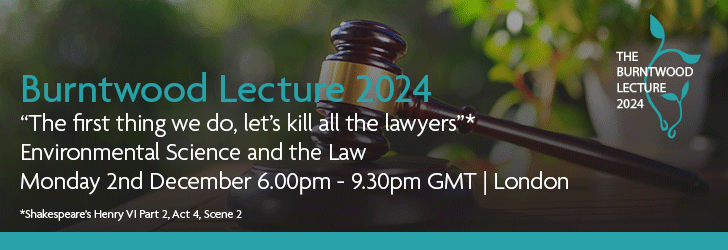‘STINKERS’ Water companies’ customers could share £800m in compensation from sewage discharges lawsuit. So said THE SUN newspaper in September.
Headlines in the UK are full of shocking stories about environmental damage, and to a lesser extent the attempts being made to bring potential or actual offenders to task. Environmental protest groups such as Friends of the Earth, Just Stop Oil and Surfers Against Sewage have been prominent, but more quietly, legal challenges are also under way, drawing on a century of tradition and broad policies.
Professional environmental scientists operate across many realms – from air and water quality, to ecology and soil health, to drought and flooding issues. These issues inevitably have a strong science basis but for effective application they require an additional diverse set of skills drawn from economics and the law.
Drawing on the speaker’s own experience, this year’s Burntwood lecture will explore the evolution of applied environmental science activity over the last thirty years or so, from inputs to planning policies concerned with building infrastructure such as roads, housing and waste disposal sites, through a focus on the sustainable management of drought and floodwaters, into engagement with major issues concerned with water supply and sewage disposal. There will be a digression into the role environmental science can play in bringing potential murderers or negligent companies and individuals to justice, as well. Most recently, the potential of competition law to address problems of privatised monopolies with damaging environmental impacts is emerging as an area of concern, and the first landmark lawsuit is in progress currently, following public uproar over sewage disposal into England’s waterways.
The Lecture
The Burntwood Lecture provides an opportunity for an eminent speaker to talk on a current, critical and often controversial environmental theme. The invited in-person audience, numbering around 150, come from the professions, universities and government, with many more attendees joining for the live stream.
If you are unable to attend the event in person, and would like to join the YouTube livestream, you can do so by following this link: https://youtube.com/live/TuHvJ1gSP64?feature=share. Alternatively, you can subscribe to our YouTube channel to get a notification when it goes live. You do not need to register to join the livestream.
Bookings are now closed.
Our Speaker

Professor Carolyn Roberts is a water resource management specialist with many years of experience of research and consultancy work in the UK and overseas, mainly in relation to the impact of developments such as housing, mining, waste disposal and industry on water quantity and quality. She has published widely on aspects of water management, flooding and drought, and was the Technical Advisor to Gloucestershire County Council following the serious Severn flooding of summer 2007. She has also undertaken many specialist investigations for the police, looking at the transport of human bodies in river and canal networks, particularly in connection with murders.
Carolyn spent eight years as Head of the large School of Environment at the University of Gloucestershire, developing an interest in innovation in Higher Education teaching and learning, and eventually directing the Centre for Active Learning, one of the UK’s national Centres for Excellence in Teaching and Learning. She moved to the University of Oxford to direct the Environmental Sustainability Knowledge Transfer Network, a government agency in the Innovate UK ‘family’ that linked businesses to universities to catalyse innovation in environmental technologies. Whilst at Oxford she also directed a Natural Environment Research Council-funded project, Project FOSTER, which concerned good practice in communications between environmental scientists and Local Authorities. She has also worked at the Universities of Exeter and Keele.
Carolyn is currently the Class Representative, leading a major legal case against six English Water companies, alleging serious pollution of rivers and canals through spilling raw sewage, and overcharging of customers.
As well as being a Fellow of IES and a Chartered Environmentalist, she is a Fellow of the Chartered Institute of Water and Environmental Management and the Royal Geographical Society. Carolyn sees the IES as a key player amongst the UK’s learned societies and professional bodies, and served on Council from 1991 - 2017, acting as Chair from 2006-2009. She was elected as a Vice President on retirement from the Chair. Prior to that she was Chair of its Education Committee for several years. In 2012 she was elected Chair of Society for the Environment, a position she held until 2014. She is currently the Thames Warden of the Worshipful Company of Water Conservators, one of London’s modern Livery Companies. She continues as Professor Emeritus of Environment and Fellow of Gresham College in London, an institution established in 1597 as the social media of its time, providing lectures to the public in English.
Our Chair
 Bernard is a Life Fellow at Hughes Hall in the University of Cambridge, and an environmental scientist with over 30 years’ experience of teaching and research. He was both founding Director of the Cambridge Unit for Landscape Modelling and initiating Director of the MPhil in GIS and Remote Sensing. He has supervised c100 successful PhD and master’s candidates including many mature and developing-world students who now play leading environmental roles in government and NGOs.
Bernard is a Life Fellow at Hughes Hall in the University of Cambridge, and an environmental scientist with over 30 years’ experience of teaching and research. He was both founding Director of the Cambridge Unit for Landscape Modelling and initiating Director of the MPhil in GIS and Remote Sensing. He has supervised c100 successful PhD and master’s candidates including many mature and developing-world students who now play leading environmental roles in government and NGOs.
Bernard’s research has contributed novel technologies. These include development of airborne laser-scanning methods for ‘seeing through trees’ which have revolutionised the world-wide discovery and mapping of archaeology under forest canopies. He has published widely and contributed to a number of radio and television programmes in the UK and Europe. He has forged strong links with industry acting as consultant on major projects to a variety of organisations including DP World, Harwich Haven Port Authority, the Forestry Commission, Environment Agency, European Union, and national and local governments.
He was elected to the IES Council in 2022 and elected as Vice Chair in October 2023.
Event Schedule
18:00 - Registration and drinks
18:35 - Welcome - IES Chair, Bernard Devereux
18:45 - Introduction to Prof. Carolyn Roberts
18:50 - “The first thing we do, let’s kill all the lawyers”: Environmental Science and the Law, Prof. Carolyn Roberts
19:35 - Respondents: Dr Claire Holman, Prof. Simon Spooner, and Kyle Lischak
19:50 - Q&A session
20:20 - Canapés, drinks, mingle
Accessibility
The IES aim to provide events, conferences and workshops which are accessible to all. If you anticipate needing any type of assistance to fully participate in this event, please email Sian Kear on events@the-ies.org or call +44 (0)20 3862 7484 to speak to somebody in person.

